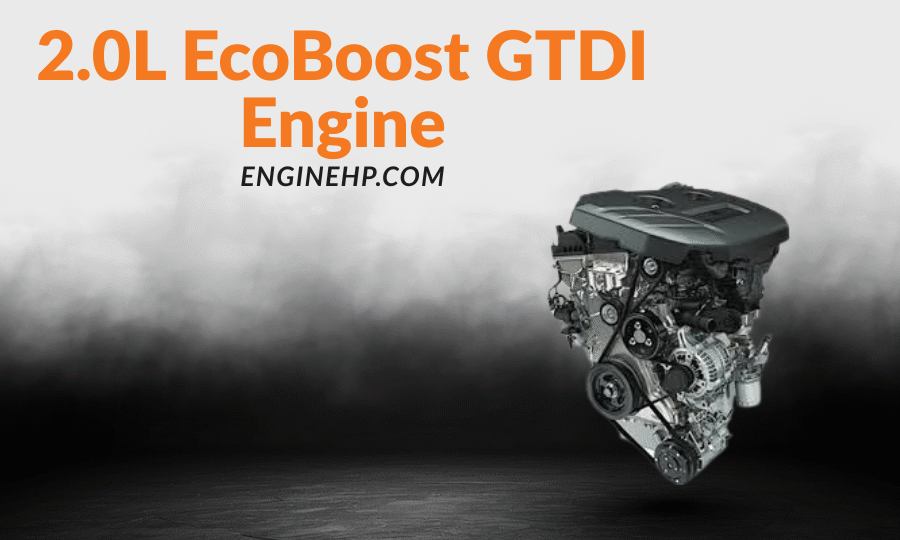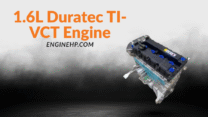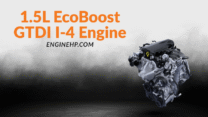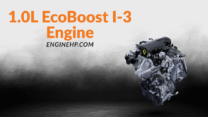
Ford Engines: 2.0L EcoBoost GTDI Engine Hp, Reliability, and Performance
In the current world of automobiles, where the power and fuel efficiency need to amalgamate, Ford s 2.0L EcoBoost GTDI engine is taking the lead. Turbocharged with direct fuel injection, it is an engine that offers high performance and amazing fuel economy; no wonder it is a popular choice in current vehicles. So what is so special about this engine in the Ford engine lineup and why should it be considered by buyers and businesses? Now we take a peek into the specs of the 2.0L EcoBoost GTDI, and what makes it such a favorite among drivers and manufacturers.
What is the 2.0L EcoBoost GTDI Engine?
The EcoBoost GTDI 2.0L engine is a turbocharged 2.0 liter four-cylinder model engine which is made by Ford. The EcoBoost designation is Ford trademark designation of its turbocharged engines that offer both high-efficiency and fuel compopts utilizing the combination of the turbocharging and direct fuel injection (GTDI) technologies in a driving -smart engine. The engine is tuned to allow a thrilling driving experience with power output great beyond its weight coupled with low fuel consumption and low emissions.
The EcoBoost 2.0L power engine is fitted in several of the Ford models such as Ford Escape, Ford Focus, and Ford Fusion and it has also flooded the market in several other brands of vehicles because of its reliability and efficiency achieved.
Key Features of the 2.0L EcoBoost GTDI Engine
- Turbocharging for More Power from Less Fuel
The key benefit of the turbocharging option with the 2.0L EcoBoost engine is that it can provide more energy consuming less fuel. A turbocharger can increase the amount of air that enters an engine thus; an engine can burn more fuel than a naturally aspirated engine of the same displacement.
- Direct Fuel Injection (DFI)
The fuel is directly injected into the combustion chamber with high pressure by DFI, which guarantees efficient combustion in the event of a fantastic mixture of air and gas. This contributes to better fuel efficiency, low carbon emission and better engine power. DFI has an overflying advantage, and that is, it optimises the fuel consumption and the power.
- Variable Valve Timing (VVT)
The 2.0L EcoBoost also comes with variable valve timing that changes the timing of the valves between the inlet and exhaust system according to driving conditions. The system optimizes power and fuel mileage to the maximum by enhancing combustion during different driving conditions to make the engine flexible and capable of driving both in the city or the highway.
- Lightweight Design
The 2.0L version of the EcoBoost engine is powerful and yet it is compact and lightweight. The size enables it to minimize the weight of the entire vehicle consequently fuel efficiency, handling, and acceleration are also enhanced. It fits most kinds of vehicles, including sedans, and compact SUVs.
- Intercooler for Enhanced Efficiency
To overcome the heat that results with turbocharging the 2.0L EcoBoost engine is fitted with the intercooler which cools down the intake air before the engine intakes it. This assists in keeping the performance levels without letting the engine to be compromised up to any degree, be it when the car is highly accelerated or where there are high temperatures.
Performance: How Does the 2.0L EcoBoost GTDI Engine Perform?
The 2.0L EcoBoost GTDI engine is not poor in terms of performance. It produces 160-250 horsepower depending on the model and a specific tuning, and provides 200-270 light-feet of torque. These numbers schematize it sufficiently to service most types of vehicles, whether you want something economical to use on a daily basis or something sportier/more powerful.
The 2.0L EcoBoost is a very efficient engine providing up to 26 MPG in the city, 34 MPG on highway in many of its models. This power/fuel economy is what makes it better off than many of the larger naturally aspirated engines since it gives users the best of both worlds.
No matter your stage of town driving or running up and down the highway, this engine, with a 2L turbo actually boasts a great acceleration and throttle response that makes it seem like a bigger engine with added advantages of a smaller size and higher fuel economy.
2.0L EcoBoost GTDI Engine Specifications
| Specification | Details |
| Manufacturer | Ford Motor Company; Cleveland Engine Plant, Brook Park, Ohio; Valencia Engine Plant in Valencia, Spain |
| Production Years | 2010–present |
| Cylinder Block Material | Aluminum |
| Cylinder Head Material | Aluminum |
| Fuel Type | Gasoline |
| Fuel System | Direct fuel injection |
| Configuration | Inline |
| Number of Cylinders | 4 |
| Valves per Cylinder | 4 |
| Valvetrain Layout | DOHC |
| Bore (mm) | 87.5 mm (3.43 in) |
| Stroke (mm) | 83.1 mm (3.27 in) |
| Displacement (cc) | 1,999 cc (122.0 cu in) |
| Type of Internal Combustion Engine | Four-stroke, turbocharged |
| Compression Ratio | 9.3:1; 10.0:1 |
| Power (hp) | 200–252 hp (149–188 kW) @ 5,500 rpm |
| Torque (lb-ft) | 221–270 lb-ft (300–366 Nm) @ 1,750–4,500 rpm |
| Engine Weight | – |
| Firing Order | 1–3–4–2 |
| Engine Oil Capacity (L) | 5.4 L (5.7 qt) |
| Engine Oil Weight | SAE 5W-30 |
| Oil Change Interval (mile) | 9,000 miles (15,000 km) or 12 months |
| Cars with this Engine | Ford Explorer, Ford Edge, Ford Falcon, Ford Escape/Kuga, Ford Mondeo/Fusion, Ford Taurus, Ford S-MAX, Ford Galaxy, Ford Focus ST, Ford Everest, Ford Tourneo, Lincoln MKZ, Lincoln MKC, Lincoln Nautilus, Radical SR3 SL, VUHL 05 |
| Note | Oil recommendations and capacity may vary depending on the car model, year, and market. Always check your vehicle’s service manual. |
Why Should Buyers Consider the 2.0L EcoBoost GTDI Engine?
Fuel Efficiency Without Sacrificing Power
If you are looking to purchase a car with power as well as good gas mileage, the 2.0L EcoBoost GTDI engine is able to supply that. Turbocharging combined with direct fuel injection guarantees that the driver experiences a responsive acceleration and sound power without emptying the gas tank.
Lower Emissions for Eco-Conscious Drivers
As consumers increasingly worry about the issue of climate change, more customers are focusing on how they can cut down their carbon footprint. The 2.0L EcoBoost engine, helps to address those requirements by much to cut on carbon emissions, again with an uncompromising performance on what drivers expect. It is good news to environmentally-conscious buyers that they do not have to compromise on the driving experience since this engine presents an environmentally-friendly engine model.
Great for Daily Commuting and Road Trips
The 2.0L EcoBoost engine is built to deliver fuel efficiency and everyday capability whether you are on the work or taking a road trip on the weekend. Its combination of decent fuel economy and general performance means that it is suited to both commuter use and journeys that demand improved fuel economy to keep driving economy high.
Low Maintenance Costs
The 2.0L EcoBoost is built with durability in mind having fewer wearing parts than other larger and more complex engines. Newer technologies such as turbocharging and direct injection put less pressure on the engine, thus, having fewer maintenance problems in the long term. Also, due to the number of vehicles that have the 2.0L EcoBoost, spare parts are easy to find and low priced.
Smooth Driving Experience
Advanced technologies built in the 2.0L EcoBoost, including VVT, turbocharging, make even the engine provide a shining drive experience with no (or little) lag. This gives it the power to handle city stop and go traffic as well as on open roads giving drivers the best of both worlds, power and a smooth, quiet elegant ride.
The Impact of the 2.0L EcoBoost GTDI Engine on the Automotive Industry
The 2.0L EcoBoost engine has challenged the thinking of the auto makers about small engine designs. It provides car manufacturers with an opportunity to produce more economical automobiles without compromising their performance since it provides a package that compliments its efficiency with a lot of power. This is especially relevant when it is a time when automakers are feeling intense pressure to keep to strict emissions standards without sacrificing the performance that buyers demand.
To the business fraternity, the adoption of the 2.0L EcoBoost engine means that it can address the needs of a large number of consumers. Fuel costs reduction, emissions improvement and performance enhancement: regardless of the objective, this engine will help automakers address the functional needs of their consumers in diverse vehicle markets, such as compact cars or mid-sized SUVs.
The 2.0L EcoBoost contributes largely to the popularity of Ford in the international market. Ford is promoting its engine as a solution that balances performance, fuel economy and environmentalism to move to the forefront of the clean performance sector in the car market.
Where Can You Find the 2.0L EcoBoost GTDI Engine?
The 2.0L EcoBoost installs in a really broad range of Ford models and has been more and more embraced by other automakers:
- Ford Escape: A small SUV, motorists can enjoy the value of an efficient and powerful model because of 2.0L EcoBoost.
- Ford focus: A compact network is where 2.0L EcoBoost engine delivers optimum equilibrium of power and economy.
- Ford Edge: A bigger SUV which has the 2.0L EcoBoost to give out both power and space in abundance and efficiency since large families can find a comfortable space in this SUV, which has a relatively low fuel cost.
- Ford Fusion: A mid-sized car with 2.0L EcoBoost, engine and sleek design and next-gen technology.
The engine has also been fitted to various models that are not related to the Ford brand, proving how broadly appealing the EcoBoost technology is as it is applied on a variety of cars across the industry.
Challenges and Considerations When Buying a 2.0L EcoBoost Engine Vehicle
Although the 2.0L EcoBoost has a lot of advantages, it has a couple of aspects that should be considered by potential purchasers:
- Turbo Lag:
Despite the fact that today there is almost no turbo lag in modern engines, the turbocharger may still have a lag effect, particularly when accelerating quickly. It is not unusual on turbo-charged engines but is less extenuated on the 2.0L EcoBoost than older systems.
- Premium Fuel Requirement:
Certain 2.0L EcoBoost versions may necessitate the usage of premium gasoline to derive the best operation. Although in most instances regular gas will be enough, it can unlock the full potential of the engine when using premium fuel.
- Initial Cost:
Cars with sophisticated engines, such as the 2.0L EcoBoost are more costly at first than cars with small and non-turbo engines. Nevertheless, the lower fuel and maintenance compared to the high start-up cost long term can be balanced.
Conclusion: Is the 2.0L EcoBoost GTDI Engine Right for You?
To sum it up, the 2.0L EcoBoost GTDI engine is a good option to have balancing on the line of performance, fuel efficiency, and lower emissions. It delivers an exciting driving experience and at the same time the factors of fuel economy and concerns to the environment are taken care of. If you are in the market to purchase any type of car (compact, family oriented, or even a performance vehicle), the 2.0L EcoBoost engine is a versatile engine with the performance characteristics needed in today competitive automobile industry.










Leave a Reply